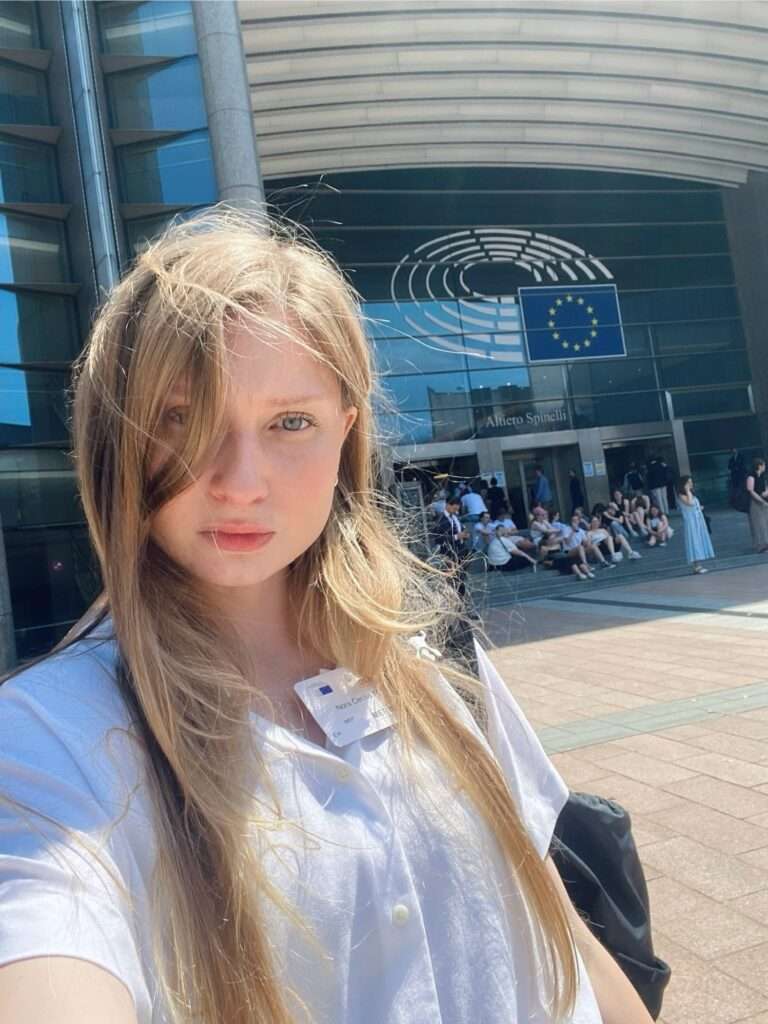Arriving in Brussels can be a bit overwhelming. As I walked into the EU quarter for the first time, I couldn’t help but feel like I had been transported into another world with huge glass buildings and where everyone wears suits, speaks five different languages, and all have Very Important Jobs. This fast-paced and dynamic environment was quite different from my quiet desk at the Swedish University of Agricultural Sciences in Uppsala. So how did I end up in this situation?
I’m Nora, a PhD student in Environmental Communication. I study environmental politics from a discursive perspective, and I take a special interest in the role of values and knowledge in debates around the green transition, for example, what politicians say and what meaning they ascribe to different concepts. One of my study areas is the politics of new biotechnologies in agriculture. As a part of this research, I knew I wanted to go to Brussels to conduct interviews with stakeholders involved in shaping new EU legislation on New Genomic Techniques (NGT) in plants. I reached out to IEEP and their team working on agriculture, and they confirmed that they saw a mutual interest in hosting me for three months. By being stationed at IEEP, I could combine my fieldwork with a fellowship stay where I get to learn what it’s like to work at a think tank and collaborate with researchers who are used to working much closer to policy.

Physically being in Brussels gave me valuable insight into how policy is made and negotiated. My interviews took me to many different offices around the city. I was fortunate enough to interview several Members of Parliament (although I must admit I did get lost in the parliament once), civil servants in the Commission, as well as stakeholders all over the spectrum, from the agricultural industry to environmental NGOs. I was quite surprised to learn that nearly all these offices were within 15 minutes walking distance from IEEP and the parliament. Although it does make sense, to contribute to policy you must be close to policymaking.
Another thing that quite surprised me was that I was met with a lot of curiosity and generosity. Both from colleagues at IEEP who shared their insights, but also informants who were willing to meet with me, help with contacts and tips, and tricks to navigate the “EU bubble”. This is knowledge I could never obtain from my desk in Uppsala.
In my conversations, I also found that people are much more willing to reflect and critically engage with polarized issues when they are given time and anonymity. A 30-60-minute research interview allows for a different kind of engagement than, say, a political debate in the parliament, where one has to stick to party lines and predetermined positions. While this makes me reflect on how political institutions are not always set up in the best way for rational deliberation, it also makes me interested in how we can develop spaces to communicate with each other in more nuanced and meaningful ways.
I learned a lot during my three-month stay at IEEP. It was interesting to learn about how the think tanks work with bridging research and policy. I feel like this is something researchers from traditional academia, especially in my field of critical discourse studies, are a bit afraid of. It can feel uncomfortable or difficult if you’re not used to it, but I think it’s worth exploring.
One highlight of my stay was collaborating on a think piece with the CAP and food team on the changing narratives on EU agriculture from the first and second terms of Von der Leyen’s Commission presidency. If you are interested in changing discourse, it’s a very interesting time to be in Brussels. What consequences are there if we start talking about a “clean” instead of a “green” deal? And what does “simplification” actually come to mean?
I found this collaboration to be an interesting exercise. Ironically, being an environmental communications scholar, I learned a lot about communication. It’s not enough to just put your research out in the world; it matters when, how, and why you do it, and what other relevant events you attach it to if you want to cut through the noise and have an impact. In turn, I was met with both interest and appreciation for the quite different discursive approach I could offer to policy analysis.
I’d like to thank my colleagues at IEEP for welcoming me to their organisation and sharing their expertise, especially the CAP and food team (as it turns out, the staff at IEEP only wear suits on special occasions, but they do speak many languages). I would also like to thank the Swedish Foundation for Strategic Environmental Research (MISTRA), for funding my fellowship stay. It’s an experience that has been very valuable and given me many impressions that I will take with me for my continued PhD studies.
